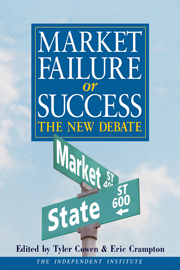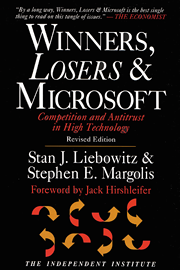Why is the Department of Justice suing Microsoft? Ostensibly, the government’s case, which it brought to court yesterday, is built on allegations that Microsoft has abused its near-monopoly status to muscle out its competitors in the software market. But underlying that charge is the belief that Microsoft’s success does not rest on having built superior products. Rather, the government believes that Microsoft has merely leveraged its control over operating systems to dominate the software market even where its products are clearly inferior to the alternatives.
Such thinking appears to have been influenced by the notion that in markets in which compatibility is important, inferior products can become the industry standard. Proponents of this idea often point to the QWERTY keyboard or the VHS video-recorder for evidence. And as compatibility is an especially important element for the computer industry, it seems logical to suppose that software products would be especially prone to this pitfall. But after a decade of research that demonstrated the QWERTY and VHS stories to be false, my collaborator, Stephen Margolis, and I found the Microsoft story to be equally unfounded.
Our research on the software market compares the quality of software found in magazine reviews to changes in market share. In particular, we looked at the two largest software markets, spreadsheets and word processors, as these form the basis of "office suites" that represent almost half of Microsoft’s revenue.
It is important to point out that Microsoft had a dominant market share in the Macintosh markets well before its success in the broader personal computer market. For example, in 1989, Microsoft Excel had a 90 percent share of the Macintosh spreadsheet market, but only a 10 percent share of the PC market. That same year Microsoft Word had a 51 percent share of the Macintosh word-processing market, but only 15 percent of the PC market. This is significant because the Macintosh operating system is not a Microsoft product, so Microsoft’s success could not have relied then, as the government alleges it does now, on leveraging its own operating system.
Instead, Microsoft achieved its success the old-fashioned way--with better products. Comparison reviews of Macintosh spreadsheets during 1986-96 rated Excel the best (or tied for the best) spreadsheet in 83 percent of the cases. In the PC market, Excel won (or co-won) 28 of the 38 comparisons while the then-leading spreadsheet, Lotus 1-2-3, managed but a single win following Excel’s introduction. Similar results obtained for Microsoft Word. Its Macintosh version received a top rating 60 percent of the time; its average score in MacUser magazine reviews since 1987 was 4.21, against 3.7 for WordPerfect and 4.0 for MacWrite. In the PC market, Word has won 16 out of 30 comparison tests since 1992, as against its biggest competitor, WordPerfect, which has won only two.
Where Microsoft products have been found inferior they have failed in the marketplace as well. Microsoft Money, which has won only 6 percent of comparison reviews of personal finance software, has made little headway against Intuit’s Quicken, despite Microsoft’s ballyhooed operating system dominance.
So what accounts for Microsoft’s success? As we examined the historical data, it became clear that Microsoft’s experience in creating successful graphical products (using menus, mice and windows) for the Macintosh helped it create successful products for Windows, unlike both WordPerfect and Lotus 1-2-3, whose products in the Macintosh markets were failures.
Microsoft has also been able to offer consumers not only lower but actually declining prices. For example, prices in the word-processing market, which rose by about 35 percent under WordPerfect’s dominance, have declined by about 75 percent since Microsoft Word gained ascendancy. This dramatic drop is far larger than in most other software markets and is inconsistent with a view that Microsoft behaves like a monopoly once it attains a large market share.
In short, Microsoft’s success is due to factors--lower prices and superior quality--that have nothing to do with antitrust violations. The threat to consumers here comes from the government, not Microsoft.










